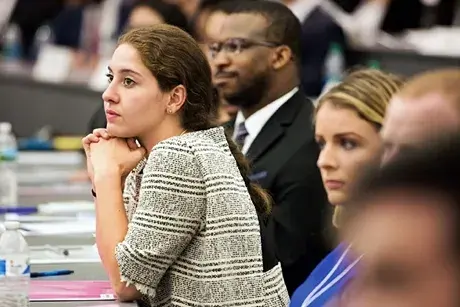Diversity, Front and Center
RWU Law is more than twice as diverse as it was just seven years ago – a shift that's making the school stronger than ever ...

Entering its 25th anniversary year, Roger Williams University School of Law has become an integral part of the Rhode Island and regional legal profession and the community at large. In each upcoming issue of the RWU Law e-newsletter this year, we will examine a different aspect of the school’s evolution over that period in the areas of (1) diversity, (2) experiential learning, (3) public interest, and (4) affordability.
Diversity is an exciting place to begin. In this fall’s entering class of 1Ls, fully 32 percent identify as racially and/or ethnically diverse, the highest number in the school’s history – in a class that, incidentally, also includes the highest-ever percentage of women, at 56 percent. In addition, ten percent of the class identifies as LGBTQ.
“These are not just numbers. The changes in and to our student body reflect the society our students and alumni serve.”
The result is a group of students with an extraordinary breadth of perspective and purpose. At RWU Law, classroom experiences are informed by diverse cultural and legal perspectives that challenge and deepen students’ understanding of the communities they serve. And they put that education to work while in law school and after they graduate – effectuating change, improving their communities, fighting for the disadvantaged and changing their world.
This outcome is the fruition of deliberate decisions that have more than doubled the school’s diversity, explains RWU Law Director of Diversity and Outreach Deborah Johnson.
“When I arrived at Roger Williams in 2011, the ethnic and racial diversity in the first-year class was 15 percent,” she says. “Today, by contrast, when I walk through the hallways I see faces and hear conversations that reflect a vast array of backgrounds and experiences – faces and conversations that were barely seen or heard when this law school opened in 1993. The look and feel of the law school is very different than it used to be.”
It’s a shift that has made Roger Williams stronger, notes Dean Michael J. Yelnosky. “I am proud to be part of an institution that recruits a diverse student body, that supports that student body, and that puts issues of race, gender, sexual orientation, religion and law front and center inside and outside the classroom,” he says.
Changing Realities
As Johnson explains, these demographic shifts within the law school reflect changing realities in American life and society.
“These are not just numbers,” she says. “These changes in and to our student body reflect the society our students and alumni serve. They also reflect the extension of opportunities to students who previously may not have had such opportunities. And they reflect victories for groups who have been historically marginalized and excluded from the legal profession.”
The school’s LGBTQ population is a good example of this dynamic, Johnson notes.
“In the time that I’ve been here, the right to marry has been extended to same-sex couples and thus to an increasing number of members of our law school community,” she says. “That has meant more than words and numbers can speak.”
Dean Yelnosky explains that a recognition of these shifts is reflected in the law school’s core values, noting:
- “We genuinely believe that a diverse student body, faculty and staff improves the educational experience by creating the conditions for an intellectually and personally challenging exchange of ideas”;
- “We believe that a diverse student body helps prepare all of our students for practice in an increasingly diverse profession, country, and world”; and
- “We believe that diversity is a matter of social justice, because for far too long certain groups have been excluded from the legal profession and the privileges and responsibilities that come with membership in it.”
The Road Ahead
Indeed, much has been accomplished, but plenty of work remains to be done.
“We can, should and absolutely must celebrate our increased diversity,” Johnson says. “But we must increasingly focus on issues of inclusion and continue our fight for equity – to ensure that all those who enter our doors feel welcomed and included as members of our community, and that all have fair and equal access to opportunities that will allow them to learn, grow, and thrive.”
Yelnosky is also hopeful that these goals will be fulfilled.
“We should be proud of what together we have accomplished,” he says, “and I am confident we will continue to make progress. The health of RWU Law, of the legal profession and of the society depend on it.”
